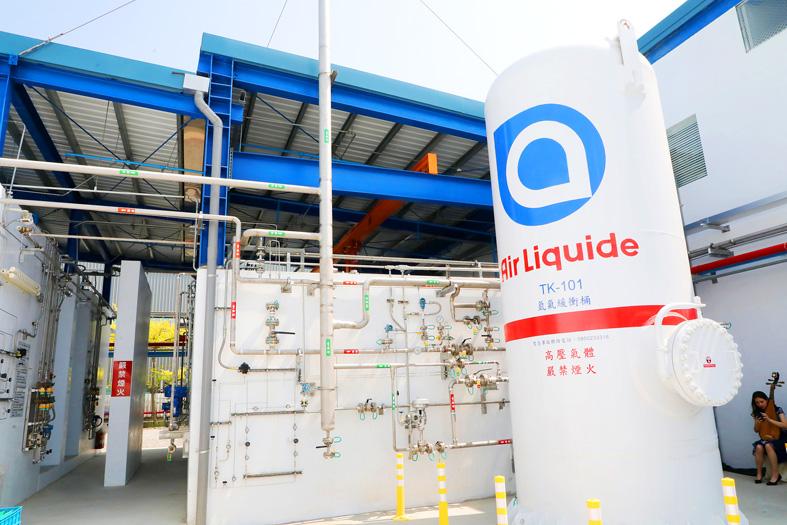Air Liquide Far Eastern Ltd’s (ALFE, 亞東工業氣體) 25-megawatt ultra-pure, low-carbon hydrogen electrolyzer plant yesterday began operations at the Tainan Technology Industrial Park (台南科技工業區), with the aim of supplying hydrogen gas to the park’s semiconductor manufacturers.
Speaking at the opening ceremony, Tainan Mayor Huang Wei-che (黃偉哲) said that the plant would not only aid the development of the nation’s semiconductor industry, but also open the door to “green hydrogen” applications.
“This is the world’s first ultra-pure, low-carbon hydrogen electrolyzer plant,” Huang said. “It will support the development of all sorts of potential hydrogen applications in Taiwan.”

Photo courtesy of Tainan City Government via CNA
“This project illustrates the investment opportunities that exist in Taiwan for foreign businesses,” he added.
Air Liquide said the traditional method for reducing hydrogen from methane, or steam-methane reforming, is cheap, but highly polluting.
However, the electrolyzer technology employed by Air Liquide produces highly pure hydrogen without any carbon dioxide.
Compared with a traditional plant, the new plant would reduce carbon dioxide emissions by 35,000 tonnes per year — equivalent to how much carbon is absorbed by 1 million trees per year.
ALFE is a joint venture between France’s Air Liquide SA and Far Eastern New Century Group (遠東新世紀集團).
Air Liquide is the world’s leading producer of high purity industrial gases.
In addition to the hydrogen plant in Tainan, the company is building a NT$4 billion (US$141.3 million) facility at the Hsinchu Science Park (新竹科學園區) to produce highly pure industrial gases for the semiconductor industry.

Sweeping policy changes under US Secretary of Health and Human Services Robert F. Kennedy Jr are having a chilling effect on vaccine makers as anti-vaccine rhetoric has turned into concrete changes in inoculation schedules and recommendations, investors and executives said. The administration of US President Donald Trump has in the past year upended vaccine recommendations, with the country last month ending its longstanding guidance that all children receive inoculations against flu, hepatitis A and other diseases. The unprecedented changes have led to diminished vaccine usage, hurt the investment case for some biotechs, and created a drag that would likely dent revenues and

Global semiconductor stocks advanced yesterday, as comments by Nvidia Corp chief executive officer Jensen Huang (黃仁勳) at Davos, Switzerland, helped reinforce investor enthusiasm for artificial intelligence (AI). Samsung Electronics Co gained as much as 5 percent to an all-time high, helping drive South Korea’s benchmark KOSPI above 5,000 for the first time. That came after the Philadelphia Semiconductor Index rose more than 3 percent to a fresh record on Wednesday, with a boost from Nvidia. The gains came amid broad risk-on trade after US President Donald Trump withdrew his threat of tariffs on some European nations over backing for Greenland. Huang further

CULPRITS: Factors that affected the slip included falling global crude oil prices, wait-and-see consumer attitudes due to US tariffs and a different Lunar New Year holiday schedule Taiwan’s retail sales ended a nine-year growth streak last year, slipping 0.2 percent from a year earlier as uncertainty over US tariff policies affected demand for durable goods, data released on Friday by the Ministry of Economic Affairs showed. Last year’s retail sales totaled NT$4.84 trillion (US$153.27 billion), down about NT$9.5 billion, or 0.2 percent, from 2024. Despite the decline, the figure was still the second-highest annual sales total on record. Ministry statistics department deputy head Chen Yu-fang (陳玉芳) said sales of cars, motorcycles and related products, which accounted for 17.4 percent of total retail rales last year, fell NT$68.1 billion, or

HSBC Bank Taiwan Ltd (匯豐台灣商銀) and the Taiwan High Prosecutors Office recently signed a memorandum of understanding (MOU) to enhance cooperation on the suspicious transaction analysis mechanism. This landmark agreement makes HSBC the first foreign bank in Taiwan to establish such a partnership with the High Prosecutors Office, underscoring its commitment to active anti-fraud initiatives, financial inclusion, and the “Treating Customers Fairly” principle. Through this deep public-private collaboration, both parties aim to co-create a secure financial ecosystem via early warning detection and precise fraud prevention technologies. At the signing ceremony, HSBC Taiwan CEO and head of banking Adam Chen (陳志堅)